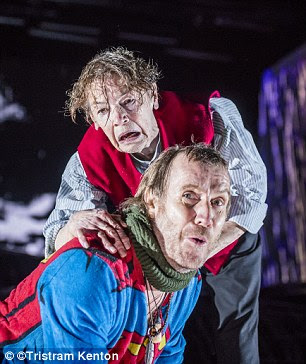If you are gonna go, go big.
When Glenda Jackson stood down last year from being the Member of Parliament of Hampstead and Highgate after 23 years, it was assumed she might make a return to acting but in what? Her first role was in a Zola radio adaptation but there are no great leading roles for an 80 year-old actress in the theatre. Simple, take over a male role...
The result is a performance of mighty power and endurance and her casting really has no effect on the play, at times seemingly channeling Wilfred Brambell in STEPTOE AND SON, Jackson gave us a wily, querulous old man, capable of angry rages at all and sundry.
It was a magnificent achievement but it came with conditions: it's rare for me to not be moved at the end of the play with it's shattering final scene, no matter how awful Lear has behaved, but here it was only thanks to Shakespeare's words that a tear trickled. Jackson might have given us a powerful Lear but it was one that was hard to feel any empathy for.
Appropriately, it was at the Old Vic I first saw Glenda Jackson on stage, 32 years ago as Phedra in Philip Prowse's remarkable production. I subsequently saw her a few times more onstage and always found her to be easy to appreciate but hard to like. I think it was/is largely due to her testy and abrasive vocal delivery, she has never had a particularly warm voice which is why she made a such a success in roles that called for a certain tart, sardonic quality.
Here she exploits that to the full, raging at Cordelia for her refusal to say how much she loves Lear, raging at Regen and Goneril who are so quick to undermine his attempts at being an independent retired King by refusing him a retinue of 100 knights, raging at the storm that dares to whip around him at his lowest ebb and raging at the sanity that is fast escaping him. The moments of tenderness were less effective: the reunion with Cordelia felt thrown away and, as I said, the final scene seemed to be a missed moment.
This could very possibly be more of a result of Deborah Warner's over-imagined production. It's like she read through my previous blogs, made a list of what I hate then based all her creative decisions on them. I so wanted to enjoy the production but kept being confronted by the usual, dreary, look-at-me-look-at-me Director Theatre tropes.
My new
bete noir is the nonsense of pretending the curtain is down when the audience enters the auditorium: we were treated to an interminable period of understudies wandering about, shifting the minimal flats that make up the scenery, talking into head-mikes, hoovering or carpet cleaning (very badly it would seem as they took ages on the same spots) or our leads sitting on chairs reading newspapers, talking to each other then wandering off to presumably get their make-up on. Does Warner really think we buy all this cock - the audience saying to each other "Ooo look, that's what happens on the stage before the curtain goes up, aren't we lucky the Old Vic doesn't seem to own tabs?".
The only time I felt the minimalist design by Warner and Jean Kalman was effective was during the storm scene, seemingly done with black rubbish sacks sealed together that rippled, blew and flapped to show the ferocity of Lear's storm. I did however like Kalman's atmospheric lighting.
Much was made of the starry cast that Warner has surrounded Jackson with but I felt they were all rather under-powered - if they feel drained by Warner's Brechtian approach then they are not to blame but I honestly was expecting more from Celia Imrie as Goneril and Jane Horrocks as Regen. Imrie was bland and Horrocks seemed to make her high heels do most of her work for her although she did rouse herself briefly when she snarled her anger at Lear in their confrontation scene. She also had the best piece of business too when she hurled Gloucester's eye out into the stalls!
Morfydd Clark's Cordelia was a bit more animated than I have usually seen her but it really is a thankless role: each time she appears she is different - rebellious daughter, forgiving daughter, liberating invader, corpse. Danny Webb and Karl Johnson made an impression as Cornwall and Gloucester, William Chubb was a sympathetic cuckolded Albany and I liked Gary Sefton as the oily courtier Oswald.
Sefton would have made an excellent Edmund but we were stuck with the woeful Simon Manyonda who played the role like a Southwark estate 'yoof'. Against such a ghastly performance, Harry Melling could only impress as the good brother Edgar even if he had a rather ill-starred nude scene. Sargon Yelda also was an underwhelming Kent, especially when one
remembers how Stanley Townsend mined the role for marvellous moments in
Sam Mendes' National Theatre production.
Rhys Ifans I also found problematic as Lear's Fool; any momentum the first act developed came to a juddering halt whenever he appeared in his grubby Superman outfit as Warner has seemingly allowed him to add scene-stealing business but which just left me staring at him in dismay. Warner also disposes with any idea as to the Fool's disappearance from the second act - he is left sitting in a shopping trolley at the end of act one!
I am sure I will remember this KING LEAR for Glenda Jackson's astonishing performance but probably not much else sadly.








































